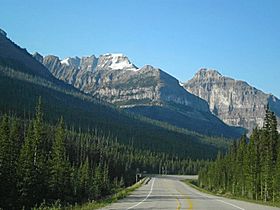Vermilion Pass facts for kids
Quick facts for kids Vermilion Pass |
|
|---|---|

Highway 93 at Vermillion Pass with Stanley Peak
|
|
| Elevation | 1,680 m (5,512 ft) |
| Traversed by | Alberta Highway 93, BC Highway 93 |
| Location | Banff National Park, Alberta / Kootenay National Park, British Columbia, Canada |
| Range | Canadian Rockies |
| Coordinates | 51°13′39″N 116°02′59″W / 51.22750°N 116.04972°W |
The Vermilion Pass is a special place high up in the Canadian Rockies. It is like a natural gateway through the mountains. This pass is 1,680 meters (or about 5,512 feet) above sea level.
It is important because it crosses the continental divide. This is an imaginary line where rainwater on one side flows to one ocean, and water on the other side flows to a different ocean.
Contents
What is Vermilion Pass?
A mountain pass is a lower area between mountains that makes it easier to travel through. The Vermilion Pass helps people and animals cross the big Canadian Rockies mountain range. It is a natural path that has been used for a very long time.
Where is Vermilion Pass Located?
The Vermilion Pass is found right on the border between two of Canada's beautiful national parks. On one side, you have Kootenay National Park in the province of British Columbia. On the other side, you find Banff National Park in the province of Alberta. This means the pass connects these two amazing parks.
Crossing the Continental Divide
The Vermilion Pass is one of the few places where you can easily cross the continental divide in the Canadian Rockies. Imagine a roof: rain falling on one side goes one way, and rain on the other side goes another. The continental divide is like the peak of that roof for a whole continent! At Vermilion Pass, water on the British Columbia side eventually flows towards the Pacific Ocean, while water on the Alberta side flows towards the Atlantic Ocean (through Hudson Bay).
Highways Through the Pass
Two important roads, Alberta Highway 93 and British Columbia Highway 93, meet at Vermilion Pass. These highways allow cars and trucks to travel through the mountains. They connect different towns and cities, making it easier for people to visit the national parks and see the stunning mountain scenery.
 | Stephanie Wilson |
 | Charles Bolden |
 | Ronald McNair |
 | Frederick D. Gregory |

